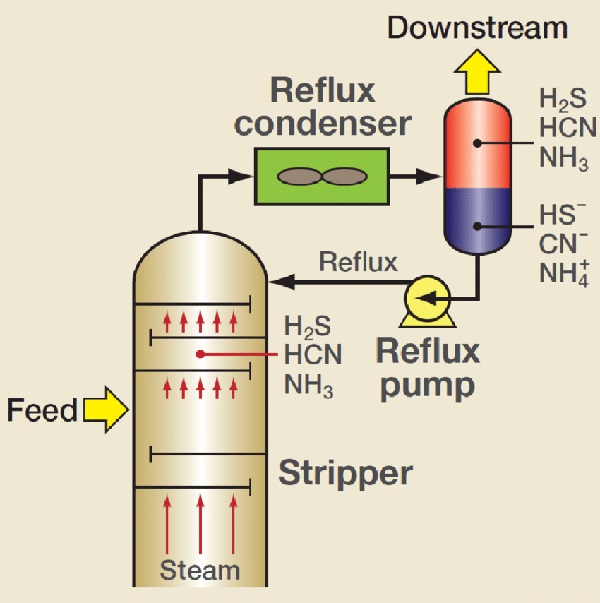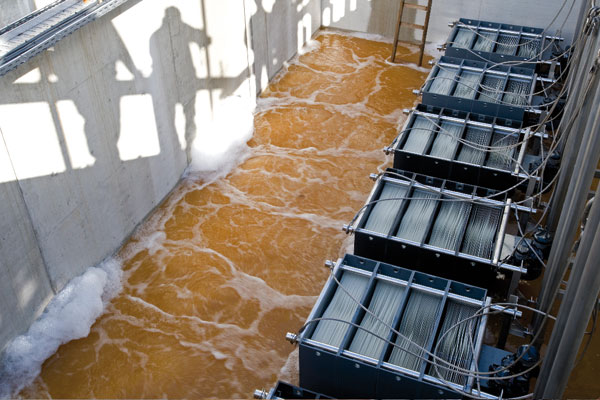Sour Water Treatment Technologies
Sour water treatment is a critical process in the oil and gas industry, specifically in refineries and gas processing plants, where “sour water” refers to highly acidic and contaminated wastewater that contains hydrogen sulfide (H2S) and ammonia (NH3) and other pollutants dissolved in it.
Sour water is typically generated as a byproduct of various refining processes, such as desalting, crude distillation, and fluid catalytic cracking. The treatment of sour water is necessary to comply with environmental regulations, prevent corrosion, and ensure safe handling.
Sour water treatment is a complex process that requires careful consideration of the specific contaminants present, process conditions, and regulatory requirements. The choice of treatment technology depends on factors such as the scale of operations, H2S and ammonia concentrations, and the desired water quality for discharge or reuse.
Proper treatment of sour water is critical to meet environmental regulations and protect human health. There are several sour water treatment technologies available, including:
Steam Stripping
Steam stripping is a common method used in sour water treatment to remove volatile contaminants, particularly hydrogen sulfide (H2S) and ammonia (NH3), from sour water streams.
In Steam stripping, sour water is heated to a temperature at which the target contaminants, particularly H2S and NH3, become volatile. The heating is typically achieved by injecting steam into the sour water. The applied heat causes the volatile contaminants (H2S, NH3) to vaporize or become gaseous. The objective is to convert these contaminants from the liquid phase to the vapor phase.
The mixture of water vapor and volatile contaminants is then directed to a separation unit, such as a distillation column or a vapor-liquid separator. In this unit, the vapor and liquid phases are separated. The water vapor is condensed back into liquid form, leaving behind the volatile contaminants in the vapor phase. This separation is crucial for obtaining treated water.
Biological Treatment
Biological treatment in sour water treatment involves the use of microorganisms to biologically convert contaminants, such as hydrogen sulfide (H2S) and ammonia (NH3), into less harmful or non-toxic substances. This method harnesses the metabolic activities of specific bacteria to promote the conversion of sour water constituents. This technology is often used in conjunction with steam stripping to remove the remaining contaminants that are not easily removed by the distillation process.


Membrane Filtration
Membrane filtration is a sour water treatment technology that uses a semi-permeable membrane to separate the contaminants from the water. The process removes suspended solids, hydrocarbons, and other contaminants such as hydrogen sulfide (H2S) and ammonia (NH3)
This method is effective for removing dissolved and suspended contaminants at a molecular level.
Membrane filtration is a versatile and effective technology in sour water treatment, and its application can be customized based on the specific characteristics of the sour water and treatment goals. It is often used in combination with other treatment methods for comprehensive sour water treatment solutions.
Chemical Treatment
Chemical treatment is another sour water treatment technology that involves adding chemicals to the water to neutralize the acidity and precipitate the contaminants. Chemical reactions take place between the added chemicals and the contaminants. For example, scavenging agents react with H2S to form non-volatile compounds, while amines selectively absorb H2S and ammonia.
This process is often used in conjunction with steam stripping or biological treatment to remove the remaining contaminants.
Sour water treatment offers several benefits
Prevention of Corrosion
Sour water often contains corrosive compounds like H2S, which can cause corrosion in equipment and infrastructure. Sour water treatment helps prevent corrosion, extending the lifespan of assets and reducing maintenance costs.
Safety Enhancement
Sour water treatment contributes to overall safety in oil and gas facilities by reducing the risk of toxic gas releases. This is critical for preventing accidents, ensuring worker safety, and maintaining a safe working environment.
Operational Efficiency
Sour water treatment improves the efficiency of oil and gas processing operations by preventing corrosion, minimizing disruptions, and optimizing the performance of equipment and systems.
Reduced Environmental Impact
Treating sour water reduces the environmental impact of industrial activities by controlling emissions and preventing contamination of air, water, and soil.
Resource Conservation
In some cases, treated sour water can be reclaimed and reused within industrial processes, contributing to water conservation efforts and reducing the demand for fresh water resources.
Cost Savings
While there are costs associated with sour water treatment, the long-term benefits include cost savings related to reduced maintenance, equipment replacement, and potential liabilities associated with environmental violations.
At AIMEQUIP, we offer a range of sour water treatment technologies to help you effectively manage your waste stream. Our team of experts can help you select the right technology for your application and provide installation and maintenance services. Contact us today to learn more about our sour water treatment solutions.
